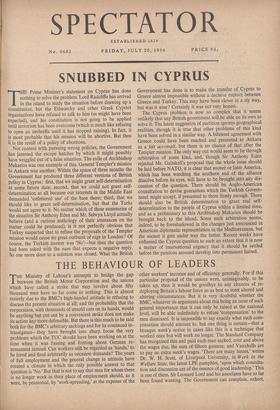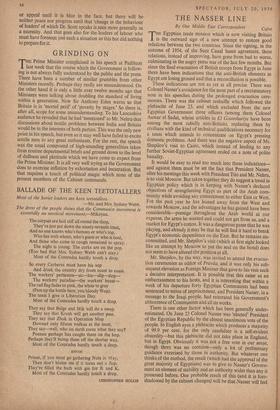THE BEHAVIOU R OF LEADERS
THE Ministry of Labour's attempts to bridge the gap between the British Motor Corporation and the unions which have called a strike that may involve about fifty thousand men have so far come to nothing. This is almost entirely due to the BMC's high-handed attitude in refusing to discuss the present situation at all; and the probability that the corporation, with thousands of unsold cars on its hands, would be anything but put out by a convenient strike does not make its action any more defensible. But there is this much to be said both for the BMC's arbitrary sackings and for its continued in- transigence—they have brought into sharp focus the very problems which the TUC should have been working on at the time when it was fussing and fretting about German re- armament instead. Can workers still be regarded as 'hands,' to be hired and fired arbitrarily as occasion demands? The years of full employment and the general change in attitude have created a climate in which the only possible answer to that question is 'No.' But that is not to say that men for whom there is no longer work in their place of employment should, as it were, be pensioned, by 'work-spreading,' at the expense of the other workers' incomes and of efficiency generally. For if this particular proposal of the unions were, unimaginably, to be taken up, then it would be goodbye to any chances of re- deploying Britain's labour force so as best to meet altered and altering circumstances. But it is very doubtful whether the BMC, whatever its arguments about this being an issue of such general importance that it can only be raised at the national level, will be able indefinitely to refuse 'compensation' to the men dismissed. It is impossible to say exactly what such com- pensation should amount to, but one thing is certain—that a brusque week's notice in cases like this is a technique that worked once but will work no longer. The Standard Company has recognised this and paid each man sacked, over and above the wages due, the sum of fifteen guineas; and Vauxhalls are to pay an extra week's wages. 'There are many issues,' writes Dr. W. H. Scott, of Liverpool University, in Work in the Welfare State, the latest LPE pamphlet, 'upon which consulta- tion and discussion are of the essence of good leadership.' This is one of them. Sir Leonard Lord and his associates have so far been found wanting. The Government can complain, exhort,



















































 Previous page
Previous page